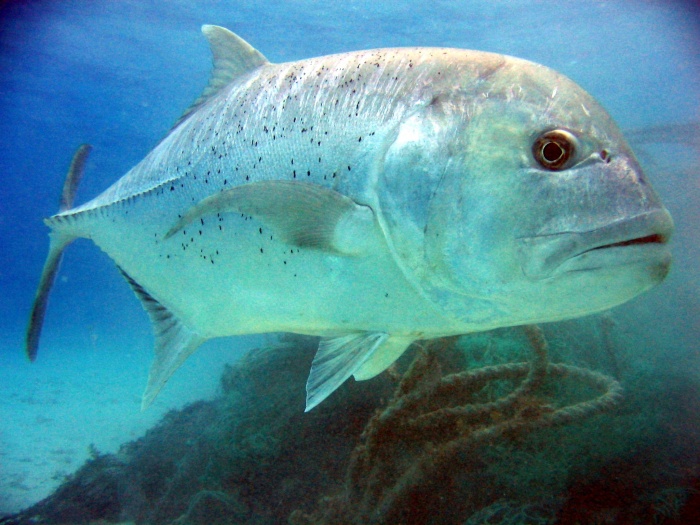Family: Carangidae
Scientific name: Caranx ignobilis
Common names: giant trevally, GT, giant kingfish, barrier trevally
Chinese names: (transliterated) lang ren shen, jhen shen, niou gang shen
Habitat: Habit ranges from inshore reefs, lagoons and estuaries to offshore waters. Usually found near submerged structures such as reefs, banks and drop-offs.
Size range: Have been known to grow to sizes in excess of 160 cm. The giant trevally reaches sexual maturity at 60 cm.
 A large female giant trevally cruising over a reef. Males darken as they mature. Photo by NOAA.A top target of saltwater anglers not just in Taiwan, but throughout the Indo-Pacific region, the giant trevally or GT is an apex predator of the tropical and sub-tropical zone. Strong and aggressive, they are a favorite on all types of tackle. Schools of juveniles congregate near inshore reefs and sandy lagoons, making them a fun diversion for light tackle anglers. Hefty solitary adults challenge inshore and offshore anglers alike.
A large female giant trevally cruising over a reef. Males darken as they mature. Photo by NOAA.A top target of saltwater anglers not just in Taiwan, but throughout the Indo-Pacific region, the giant trevally or GT is an apex predator of the tropical and sub-tropical zone. Strong and aggressive, they are a favorite on all types of tackle. Schools of juveniles congregate near inshore reefs and sandy lagoons, making them a fun diversion for light tackle anglers. Hefty solitary adults challenge inshore and offshore anglers alike.
A member of the family of jacks known as Carangidae, they can be distinguished from amberjacks and yellowtail by the deeper curve their bodies and their steeply sloping forehead profiles. Juveniles and adult females are silvery in color with irregular black spots, while adult mails darken to almost black as they mature.
As with amberjacks, GTs are frequently targeted by boat anglers speed jigging large blade lures near submerged structure. Another common approach is casting top-water or shallow-running lures, particularly large poppers, which imitate struggling or injured baitfish. These tactics often product the violent strikes and pitched battles that make GTs so beloved by saltwater anglers.
Because of their tendency to hunt near reefs, GTs are among the larger of species accessible to shore anglers. Rock outcroppings and jetties along Taiwan’s north shore and east coast are the preferred haunt of those hoping to hook one. Favorite spots for GT anglers in the north include the outflows of the island’s nuclear power plants where warm water used to cool the reactors is released back into the sea.
Giant trevally prowl all the waters surrounding Taiwan, including the offshore islands. Late winter and spring are considered the best time to pursuing them. While some anglers consider them a good table fish, trevally have frequently be implicated in cases of ciguatera poisoning. Because of this fact as well as the depletion of the species in some areas, many anglers practice catch-and-release with GTs.